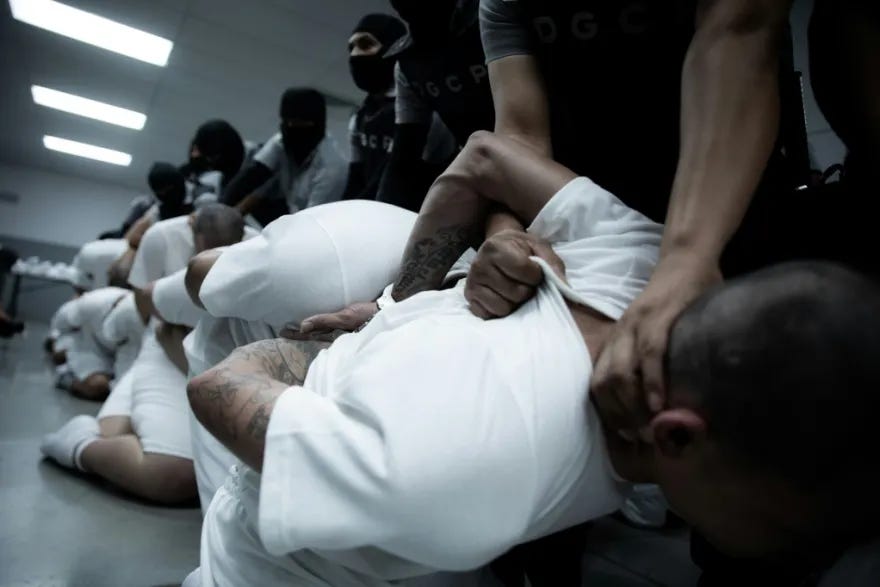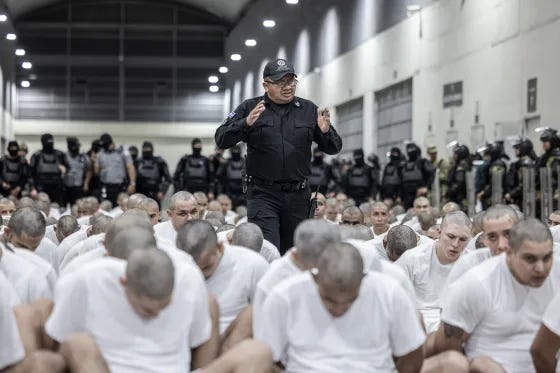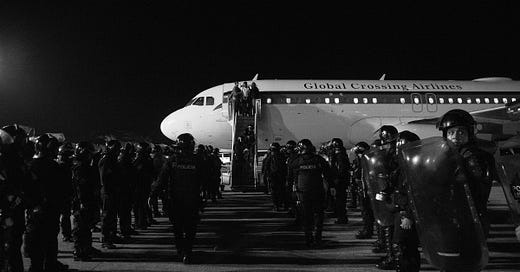Deported to Dystopia: How the Trump Administration Turned Migrants, Asylum Seekers, and Legal Residents into Ghosts
The journey of more than two hundred men, each denied due process, into the luminous Salvadoran dungeon known as CECOT
March 16, 2025: The night 261 men became ghosts.
Part three in a four-part series examining the Trump administration’s violation of logical, legal, and ethical principles in unilaterally deporting hundreds of men to a Salvadoran maximum security prison. Read part one and part two.
The men deported to El Salvador by the Trump administration must have felt like they stepped into a surreal dystopia as they exited U.S. planes just after midnight on March 16, 2025. Before them, a dark ocean of black helmets, hard faces, and armored men. Bound, bowed, and held by the nape of the neck, the 261 deported men were steered from the planes and prodded through an ominous parade of silent Salvadoran officers wielding shields and guns.
As reported by 60 Minutes, most of the men condemned to El Salvador’s notorious maximum security prison, Terrorism Confinement Center (CECOT), have no criminal records inside or outside of the United States. The Trump administration relied upon flagrantly fallacious appeals and the faulty symbolic criteria of generic tattoos and urban athletic wear to determine who constituted a “monster,” “terrorist,” or “gang member” deserving of total depersonalization and dehumanization.

The Trump administration’s dearth of rational justification for deciding the guilt and punishment of men like soccer player Jerce Reyes Barrios and makeup artist Andry Hernández Romero explains their vehement objections to due process proceedings for the accused. This lack, coupled with the demeaning confinement at CECOT, offers visceral reminders of the dangers of permitting political authorities to trample upon precious human principles like the presumption of innocence.
Given President Trump’s April 2025 endorsement of deporting U.S. citizens to El Salvador’s prison system, it’s clear that such principles are important to U.S. citizens and non-citizens alike. And while the White House Press Secretary said that President Trump is only looking into exporting U.S. citizens guilty of committing the most heinous of crimes, such a qualification should offer little comfort given the fact 75% of the so-called worst-of-the-worst initially deported possessed no criminal record whatsoever.
“Holding my camera, it was as if I watched them become ghosts.” – Philip Holsinger, photojournalist, on witnessing the dehumanization of deportees at CECOT.
A Dystopian Handover
Photojournalist Philip Holsinger was on the ground when President Trump’s cargo of deported and disappeared men—all denied due process and fewer than 5% with a violent criminal record—arrived in El Salvador. Holsinger bore witness to the men’s degrading transformation from individuals to nondescript CECOT detainees. “They move them fast and hard,” explained Holsinger. “And they intentionally want them to feel that they're powerless.”

Officers led their prisoners to busses and the custody of CECOT guards, whose government is receiving $6 million from the United States to warehouse the deported men. On the bus, a prisoner who dared to turn toward Holsinger’s camera was grabbed by the hair and had his head forced down against the seat in front of him. Holsinger described the incident as an early lesson in the “powerlessness” the detained men are conditioned for at CECOT.

Upon arriving at the prison complex, the new inmates were herded into a room where their hair was carelessly shaved. Prison barbers made no effort to minimize pain, sometimes nicking inmates’ heads and leaving unshaved patches of hair. One man’s resignation to the confounding ordeal impacted Holsinger. “He may be a criminal,” explained Holsinger. “He may be innocent. He may be a father. I don't know his story at all. But I know his eyes. He didn't fight. Hopelessness just gave in.” Another display of dominance, another lesson in control.

With their hair removed, the men were forced to strip off their clothes under bright lights and before the guards, and then dress in white shorts and shirts. “For these Venezuelans, it was not just a prison they had arrived at,” wrote Holsinger. “It was exile to another world, a place so cold and far from home they may as well have been sent into space, nameless and forgotten. Holding my camera, it was as if I watched them become ghosts.” The comparison to ghosts is apt.
CECOT shares many dystopic dimensions with the society of the “One State” depicted in Russian novelist, Yevgeny Zamyatin’s novel, We (1921). Set in the future sometime around 3,000 CE, the One State has eviscerated individual liberty in order to achieve maximum security and “utopic” equanimity. Everyone is assigned a number in place of a name. They live in transparent apartments to facilitate perpetual surveillance carried out by secret police paternalistically called “The Guardians.”
“Guided by authoritarian logic, the U.S. government gave shackles and a guilty verdict to the men they deported... in place of due process and the presumption of innocence.”
Inside CECOT, processed prisoners are denied speech, space, privacy, and the most perfunctory freedoms. “Life in the cell in CECOT is the definition of austerity,” said Holsinger, who has worked in El Salvador for years. “The bunks are steel. There are no blankets. There are no pillows. There's nothing. It's just a slab of metal.”

Over 250 men—most without criminal records—were shipped to a dehumanizing Salvadoran prison by the U.S. government. Their crime? Wearing athletic clothes or having tattoos of crowns, stars, and loved ones’ names.
CECOT inmates live lives of uniformity and total control. The men become unnamed prisoners, referred to by their assigned numbers and deprived of any and all possessions. They are not permitted television, books, or any contact with the outside world. The men are also silenced. “The first time I visited CECOT I was shocked by the silence,” said Holsinger. “The silence is what really—it got under my skin.”
CECOT is a functioning monument to authoritarian power conceived of as the exercise of total control over others, a defilement of humanity. Prisoners are deprived of all forms of privacy and kept under 24-hour total surveillance by armed guards. Eighty men are assigned to a single cell. They share a single toilet and showering space. They must relieve themselves and bathe in open view of guards and fellow cellmates. Inmates never leave the inside of the prison facility, bereft of the most animal need of the outdoors and sunlight. The men are allowed out of their cells for a maximum of one hour a day. The facility’s lights never dim or darken. CECOT is thus a luminous dungeon.1
The Human Cost: Stories of the Wrongfully Deported
Among those deported to CECOT was Jerce Reyes Barrios, a former Venezuelan professional soccer player and youth soccer coach with no criminal record. His family discovered his whereabouts through the horror of seeing him in El Salvador's propaganda video showing migrants deported from the United States being forcibly taken off of a plane and having their heads shaved.

Similarly, the mother of Francisco José García Casique, a barber, expected her 24-year-old son to be deported back to Venezuela only to see him, head shaven, in the Salvadoran government’s video touting the harvest of their partnership with the Trump administration. García’s mother said her son’s tattoos are not gang-related but instead read “peace” and list the names of his grandmother, mother, and sister.

In a March 20, 2025 report, The Guardian presented the cases of several young men that the U.S. government rendered to El Salvador on grounds they were gang members. The report details the cases of young men taken including Franco Jose Caraballo Tiapa, Daniel Alberto Lozano Camargo, Neri Jose Alvarado Borges, Luis Carlos Jose Marcano Silva, and Anyelo Sarabia Gonzalez.
Each appears to have been identified as a gang member on the basis of their national origin and their tattoos. Yet the young men have tattoos of loved ones’ names, prayer hands, and various messages family members and legal representatives insist are unrelated to the Venezuelan gang, Tren de Aragua (TDA). Borges, for instance, has an autism acceptance and awareness ribbon tattoo.
The fight for justice and human dignity doesn’t end here. Subscribe to Humanities in Revolt for the final installment of this series, where we expose authoritarianism’s moral failure and the unbroken spirit of resistance. Stay informed—join the humanistic revolt.
Alirio Guillermo Belloso Fuenmayo was another man sent to CECOT. Belloso was arrested by immigration agents while he was working as a food deliverer in Utah. He traveled to the United States to earn money for his wife and daughter, whom he spoke to often as he longed to return home to Venezuela. His wife and other loved ones insist that he, like so many others, has no criminal record and knew nothing of jail. “He said that sometimes he was afraid that they would hurt him,” explained his wife, Noemi Briceño. “One outside hears many bad things about jails.” That was before Belloso was taken to CECOT.

Another passenger on the frightening flights to El Salvador was Andry Hernández Romero, a gay makeup artist who fled Venezuela for what he had hoped was the safety of the United States. Hernández’s asylum journey took a terrifying turn when his tattoos were deemed to be evidence of his membership in the TDA gang by the U.S. government. A Homeland Security official vaguely referenced Hernández’s “own social media” as evidence of his gang membership. Yet investigations of his social media posts show no evidence for Homeland Security's unsubstantiated claim.
Romero Hernández’s childhood friend, Reina Cardenas, said that he wasn't into gangs. He was into makeup and costume design. “Andry dedicated his life to arts and culture,” said Cardenas, “and he worked hard to better his craft.” Romero had a particular passion for his hometown, Capacho's annual festival for Three Kings Day. “He would design and sew his own costumes, and he would do the makeup for all the women in the parade,” explained Cardenas.
Hernández’s mother, Dolores Alexis Romero de Hernández, said she cries thinking of her son every day. “What are they doing to him,” she wonders, “how are they treating him? Is he in there with bad people?” We later learn that just as Hernández cries now for her son, a photojournalist on hand during the men’s arrival to El Salvador witnessed her son crying out for her.
The Nightmare of Authoritarian Logic
On September 10, 2024, American citizen Angie González married the love of her life. On March 15, 2025 that man, Jesús Alberto Ríos Andrade, was forced onto a plane out of the country and made to disembark in a dystopia. “I felt like I was dying,” explained González of her reaction to learning her was in CECOT.
González said her husband entered the United States legally, in July 2023, and sought asylum. Ríos spent time in Maryland but eventually joined González to live in Texas. Everything changed shortly after the inauguration of Donald Trump.
On February 1, 2025, Ríos husband took a basket of laundry to the couple's car to take to the laundromat. Moments later, González looked out her window to see her husband being taken away in handcuffs by officers with ICE. Ríos was scheduled for an immigration check in the next day.
Homeland Security has deemed the Jordan Jumpman logo and attire branded with the Chicago Bulls—an NBA team that once starred iconic player Michael Jordan—indicative of gang membership.
González said she believes her husband’s rose tattoo may have been identified by immigration officials as evidence of possible gang membership. Ríos may also have been deemed a gang member for his mass-produced Air Jordan sneakers featuring the Jordan Jumpman logo. Homeland Security has deemed the logo and attire branded with the Chicago Bulls—an NBA team that once starred the iconic player, Michael Jordan, whom the “jump man” is modeled after—indicative of gang membership.


President Trump has insisted that the 261 men he sent to El Salvador are “monsters.” For the families of the abducted and all of humane spirit, the monstrosity is in the denial of basic human dignity and due process. Angie González told El Faro that the U.S. government’s abduction of her husband to CECOT “is a monstrous thing, a thing of the devil.” She is left with “nightmares” and the cruelest of mental tortures. “Sometimes I think he’s dead.”
Guided by authoritarian logic, the U.S. government gave shackles and a guilty verdict to the men deported to El Salvador in place of due process and the presumption of innocence. In sending human beings—many of whom were seeking refuge and freedom—to become numbered ghosts in CECOT, the Trump administration betrayed bedrock legal principles, proved an ally of authoritarianism, and stirred the cry of resistance. That cry will be heard in the final part of this series as we examine authoritarianism’s moral impotence in the presence of the unquelled human spirit and the eternal truths that sustain it.
The Trump administration disappeared 261 men to El Salvador without due process. Don’t let them disappear. Contact your elected officials. Educate them and tell them where you stand. Sample script below. Silence is the ally of injustice. Speak.
“I’m calling to demand oversight into the Trump administration’s deportation of migrant, residents, and asylum seekers to El Salvador’s CECOT prison. According to a 60-Minutes report, just 5% of these men had violent criminal records, yet all were denied due process based on tattoos and popular clothing. The U.S. must not outsource human rights abuses. I urge [Rep/Senator] to 1) Investigate these deportations, 2) provide legal council to detainees, and 3) end funding to CECOT.”
If you made it this far, you’re part of the humanistic revolt. Chose your next move.
1️⃣ Tap ❤️ 2️⃣ Comment 3️⃣ Share 4️⃣ Subscribe (free) 5️⃣ Support: upgrade to a paid subscription or leave a tip
See Ruhi Cenet's video, “The World's Highest Security Prison: CECOT,” YouTube, February 9, 2025 and CBS News’ interview with Ruhi Cenet, “Documentary shows harsh conditions at controversial El Salvador prison,” April 3, 2025. Also see David Culver, Abel Alvarado, Evelio Contreras, and Rachel Clarke, “In notorious Salvadoran prison, US deportees live in identical cells to convicted gangsters,” CNN, April 8, 2025






WTF…
First of all, NO government has the right to disappear people, PERIOD.
Second: EVERYONE is entitled to a chance to defend themselves in court!
Third: Living in the United States of America without proper documents IS NOT A CRIMINAL OFFENSE. I REPEAT: LIVING IN THE UNITED STATES OF AMERICA WITHOUT PROPER DOCUMENTS IS NOT A CRIMINAL OFFENSE! It is an “infraction”, like a speeding ticket and IS grounds for deportation, BUT NOT IMPRISONMENT!!
I REPEAT: WTF, WTF, WTF!!!
You capture the horror and insanity of what has happened to these men through powerful images and words. We all - the Trump administration, ICE, their mouthpieces, the media and even those calling for justice - are all referring to these actions as “deportation.”
Legal experts would likely say this is the appropriate term.
Through a sociolinguist’s lens, it powerfully conveys more than the action. It connotes a societally agreed upon, rational, and prescribed action.
We usually deport someone for violating laws. A person is deported back to their country of origin, with the chance of legally re-entering.
In the most recent instance of 200+ identified as gang members by the drawings on their skin, their all-American sneakers and hand movements likely only correctly decodable by a signing deaf person, are abducted and taken, not to their homeland, but to the hell hole CECOT prison in El Salvadore. Yes, El Salvador, the land of decades of internal war, massacres, Duarte, organized crime, and US meddling.
I ask the following, not simply as a point of rhetoric.
Why are we not calling this “exile.”
A political act. Forcibly removing a person and sending them to a place they would never choose to go.
These individuals have the “disappeared”.